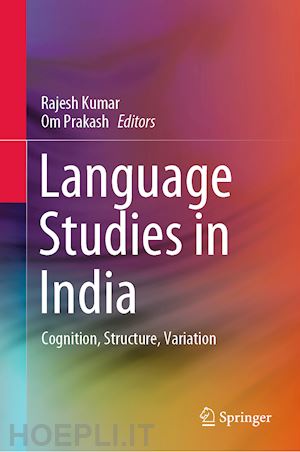
Questo prodotto usufruisce delle SPEDIZIONI GRATIS
selezionando l'opzione Corriere Veloce in fase di ordine.
Pagabile anche con Carta della cultura giovani e del merito, 18App Bonus Cultura e Carta del Docente
This book addresses a wide range of aspects of the study of language in a variety of domains such as cognition, change, acquisition, structure, philosophy, politics, and education. It offers a renewed discussion on normative understanding of these concepts and opens up avenues for a fresh look at these concepts. Each contribution in this book captures a wide range of perspectives and underlines the vigorous role of language, which happens to be central to the arguments contained therein. The uniqueness of this book lies in the fact that it presents simplified perspective on various complex aspects of language. It addresses a wide range of audiences, who do not necessarily need to have a technical background in linguistics. It focuses on complex relations between language and cognition, politics, education to name a few with reference to cognition, change, and acquisition. This book is for researchers with an interest in the field of language studies, applied linguistics, and socio-linguistics.
Chapter 1. A Troika for 21st Century Indian Linguistics.- Chapter 2. Linguistic Variation, Discourse, and Culture.- Chapter 3. Variation, Conformity, and Possibility: What We Are.- Chapter 4. Representation, Narration and Appropriateness in Hindi-Urdu Fiction.- Chapter 5. Case and Lexical Categories in Dravidian.- Chapter 6. Linguistic and Mental Landscaping in India: Reach and Impact.- Chapter 7. Language Evolution: Theories & Evidence.- Chapter 8. Structure of Language in Multilingual Settings: Some Issues.
Rajesh Kumar teaches linguistics in the Department of Humanities and Social Sciences at the Indian Institute of Technology Madras. He graduated with Ph.D. in linguistics from the University of Illinois at Urbana-Champaign. He has taught in the Department of Asian Studies at the University of Texas at Austin in the USA and IIT Kanpur, IIT Patna, and Tata Institute of Social Sciences in Mumbai in India. His book Syntax of Negation and Licensing of Negative Polarity Items was published by Routledge in their series Outstanding Dissertations in Linguistics. He has published papers in several journals and presented his work at professional meetings such as Annual Meeting of Linguistic Society of America and Chicago Linguistics Society among others. The broad goal of his research is to uncover regularities underlying both the form (what language is) and sociolinguistic functions (what language does) of natural languages. He has co-edited four books Linguistic Ecology of Mizoram, LinguisticFoundation of Identity, Language, Identity and Contemporary Society, and Text, Context and Construction of Identity with Om Prakash.
Om Prakash teaches courses in the areas of Applied Linguistics, English Language Teaching, Communication Theories in Media, and Corporate Communication in the School of Humanities and Social Sciences at the Gautam Buddha University. He received his M.A., M.Phil., and Ph.D. in linguistics from University of Delhi. He has published in journals of national and international repute. He conducts workshops in language teaching and communication for school teachers. His broader areas of research include emerging fields in Applied Linguistics and an interface of Language, Media, and Contemporary Society. He seeks to explore changing forms and functions of language in the context of ever-emerging network society. He has edited a special issue on Language and Exclusion of the Journal of Exclusion Studies (February 2017 issue). He has co-edited four books Linguistic Ecology of Mizoram, Linguistic Foundation of Identity, Language, Identity and Contemporary Society, and Text, Context and Construction of Identity with Rajesh Kumar.











Il sito utilizza cookie ed altri strumenti di tracciamento che raccolgono informazioni dal dispositivo dell’utente. Oltre ai cookie tecnici ed analitici aggregati, strettamente necessari per il funzionamento di questo sito web, previo consenso dell’utente possono essere installati cookie di profilazione e marketing e cookie dei social media. Cliccando su “Accetto tutti i cookie” saranno attivate tutte le categorie di cookie. Per accettare solo deterninate categorie di cookie, cliccare invece su “Impostazioni cookie”. Chiudendo il banner o continuando a navigare saranno installati solo cookie tecnici. Per maggiori dettagli, consultare la Cookie Policy.